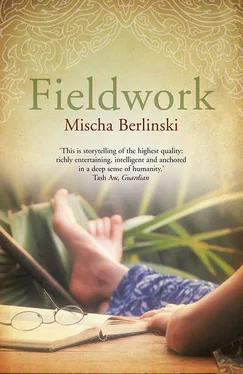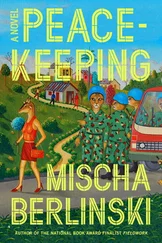But inside the hotel it was cool, dark, carpeted, and quiet, which was why I liked to read my e-mail there in the morning: in the Westin, my otherwise sluggish thoughts seemed fresh, like sprigs of winter mint. I had made friends with perky pretty little Gai, the receptionist at the Business Service Center, and she let me check my e-mail there for free, when her boss, Miss Tong, wasn't looking. Gai considered Miss Tong's insistence on charging a regular customer unseemly. What, after all, was friendship for? Miss Tong, Gai said bitterly, was kee nieo —literally translated, a sticky shit. That this is a grave insult in Thailand says a considerable amount about the Thai character to those inclined to consider the Freudian themes of anal expulsion and retention.
Joseph Atkinson wasn't my only correspondent, of course: my mother wrote me; Josh found a job managing Thailand's first gelateria . My editor at Executive wondered if I would be interested in writing a couple of thousand words about a vineyard in Loei Province, the first in Thailand. Of course I would, my interest in viticulture being longstanding. But Joseph Atkinson's e-mails were the ones that I clicked open first and read over and over again.
I always printed out Atkinson's letters for Rachel to read, before exchanging a conspiratorial smile with Gai and strolling homeward. Midway between the Westin and my house, not far from the 7-Eleven, where I stopped to drink a mango Slurpee, there was a hospital, and on the façade of the hospital hung a hand-painted canvas sign at least two stories high advertising discounts on plastic surgery. I no longer recall the text of the advertisement, but the face depicted there struck me. It was the face of a young woman, with the pale skin favored in the Thai ideal, long dark hair, and eyes as round as Meyer lemons. As was typical of Thai commercial art, the woman was neither entirely Asian nor occidental, but in-between, her face bearing the drama of Western features but none of their vulgarity. She was the product of a surgeon with the deftest touch. It was this woman's face that in my imaginings I associated with Martiya.
From the field, Martiya wrote Atkinson still more long letters. Martiya's first letters from Thailand were ebullient, he said. They made him recall his own early days in Africa, when, leaving behind gloomy London and snowbound Chicago, he first saw the land the Doyo called the Beautiful Kingdom of the Yellow Sun. Atkinson was proud to have urged her to go. She wrote exuberantly of the beauty of Thailand: the flooded lime-green rice paddies bordered by swaying palms; coconuts, mangoes, and durian for sale by the side of the road; the ornate temples with flashing mirrored roofs; wandering Buddhist monks with shaved heads in saffron robes; the cut galangal in bushels drying in the midday sun, the humid air earthy, like a root; and the sleepy, sweating water buffalo reluctantly plowing the fields. Her descriptions of Thailand, Atkinson admitted, were clichéd, but no less touching for the fact.
Atkinson gave Martiya a letter of introduction to an elderly Thai anthropologist at the University of Chiang Mai. He treated her intention to live in a Dyalo village as a silly eccentricity. He had been able to study the Karen adequately, he maintained, on visits that lasted at most a day or two, and she would not find tribal living to her taste. Did she realize, he asked, that the Dyalo had neither electricity nor running water? And the food! One need not even mention the food. The thatched roof of a Dyalo hut would leak in the rainy season. The Dyalo themselves smelled bad, although this would be less oppressive to a farang . Martiya was persistent, however, and her Thai host eventually conceded: if she insisted on wandering down the path of folly, the least he could do would be to recommend a guide. In this way she was introduced to a young Dyalo man named Vinai, who spoke a rough-and-ready English in addition to his native Dyalo and fluent Thai.
Choosing the right village is an essential part of the anthropological adventure, and for almost three months Martiya and her guide wandered the mountains of northern Thailand. They traveled by motorbike and on foot, first along the paved arteries which pulsed out from Chiang Mai, then branching onto the network of dirt roads which led from village to village. Where the roads ended, they walked, along paths which, Vinai maintained, had once been the migratory routes of wild elephants. Martiya got a sense of the new world in which she found herself. The Akha, she learned, wore silver headdresses, and exposed their twins, thinking them possessed by evil spirits. Karen virgins dressed in white. The Hmong lived at the summits of the mountains, and while the Hmong greatly admired the Yao, they enslaved the Lahu. The Hmong had grown rich as opium traders and the Lahu were often opium-addicted. The primitive Mrabri no one ever saw: they had never learned to build houses and drifted through the jungle like ghosts, taking shelter every night under makeshift lean-tos. Under every T'ai Lue house there was a loom. The Lua were sullen and stared at Martiya suspiciously. Everyone, her guide said, admired the poetry of the Lisu and the quality of their singing. The Mao were quiet folk and, like the Swiss, spoke slowly. Martiya and Vinai roamed from the Burmese to the Lao border, looking for the ideal village to study. In the end, Martiya settled herself in a Dyalo village called Dan Loi, not far from the Burmese border, and set to work.
The field did to Martiya what the field always does: it scoured her and revealed the person underneath the encrusted layers of culture and ingrained habit and prejudice. Martiya came back to Berkeley three years later, tanned and strong, and began to write. She showed a few of the chapters of her doctoral thesis to Atkinson. They were superb, he said, absolutely superb. First-rate analysis, a deep connection with the subject, and intensely well observed. But Martiya wasn't convinced: she complained that she hardly knew the Dyalo and was being asked to write their definitive story. Every graduate student — every good grad student, Atkinson qualified — feels that way, but Martiya for some reason felt it more keenly than most. Atkinson told her that he understood, that it was only after he had defended his Doyo village from a raid by a neighboring tribe, actually holding a spear in his hand, that he felt he understood the people, that he could write about them.
"So what should I do?" Martiya asked.
Write the thesis, kiddo. It's just three hundred pages of blah-blah-blah.
After about a year, she told him she wanted to go back to Thailand. She needed more data. Atkinson told her that he couldn't oppose this idea more profoundly. "Are you nuts?" he asked. She left nevertheless.
She never finished the doctoral thesis. He never heard from her again.
Not long after my e-mails with Atkinson had tapered off, the phone rang in the middle of the night. My first thought wasn't that someone was dead or needed my kidney — I just cursed Rachel's Grandma Irene. I don't think Grandma Irene ever really bought into the outlandish notion that as the sun was rising over the Puget Sound, the same sun, harsher and so much hotter, had long since set over the rice paddies of the Golden Triangle. She called us at all hours of the night.
But I was wrong. It turned out someone was dead.
The fan blew hot air across our damp backs. Our first hot season in Thailand, Rachel had asked me if we were growing apart, because I didn't hold her in the night anymore. "It's got to be a zillion degrees, Rachel, are you crazy?" I said. She looked at me doubtfully. That night, I held on to her tightly, breathing hotly on her neck. She pushed me away, and now we slept, during the hot season, on far sides of the bed. I was having a dream when the phone rang, a complicated one — interpret it as you will — in which I had just gotten a job as a waiter in a French café and needed to acquire a waiter's suit with a vest and tailcoat. No tailor in Chiang Mai would make it for me. I licked my lips when the phone rang, and for a second I wasn't sure if it wasn't the tailor from the dream calling me back.
Читать дальше












